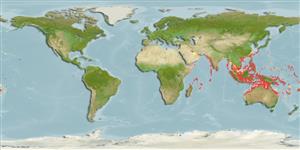Common names from other countries
>
Ovalentaria/misc (Various families in series Ovalentaria) >
Pomacentridae (Damselfishes) > Pomacentrinae
Etymology: Amphiprion: Greek, amphi = on both sides + Greek, prion, -onos = saw (Ref. 45335).
Environment: milieu / climate zone / depth range / distribution range
ນິເວດວິທະຍາ
ສັດທະເລ ກ່ຽວກັນຫີນ; ບໍ່ມີການເຄື່ອນຍ້າຍ; ລະດັບຄວາມເລິກ 1 - 70 m (Ref. 58652). Tropical; 30°N - 30°S, 47°E - 172°W
Indo-West Pacific: Persian Gulf to Western Australia, throughout the Indo-Australian Archipelago and in the western Pacific at the islands of Melanesia and Micronesia, north to Taiwan, southern Japan and the Ryukyu Islands.
ຂະໜາດ / ນ້ຳໜັກ / Age
Maturity: Lm ? range ? - ? cm
Max length : 15.0 cm SL ຕົວຜູ້/ບໍ່ມີເພດ; (Ref. 6113); ອາຍຸສູງສຸດທີ່ເຄຍລາຍງານມາ: 11 ປີ (Ref. 11318)
ຄີ (ໜາມ)ແຂງຢູ່ຫຼັງປາ (ທັງໝົດ) : 10; ຄີຫຼັງຂອງປາ (ຄີອ່ອນ) (ທັງໝົດ) : 15 - 16; ຄີ(ໜາມ) ແຂງຢູ່ຄີກົ້ນປາ
ກຸ່ມປາກະດູກແຂງ
ຄວາມຖີ່ຂອງກຸ່ມຖ່າຍທອດພັນ
ປາທີ່ມີການເຄື່ອນຍ້າຍຈາກທະເລໄປຫານ້ຳຈືດ ແລະນ້ຳຈືດຫາທະເລ
ປາທີ່ມີການເຄື່ອນຍ້າຍຈາກທະເລແລະໄປໄຂ່ຢູ່ນ້ຳຈືດ
ຄີກົ້ນຂອງປາ
ສັດທີ່ມີກະດູກສັນຫັຼງ
ການຖ່າຍທອດທາງກຳມະພັນຈາກພໍ່ແມ່ຫາລູກ: 2; ຄີກົ້ນຂອງປາ: 13 - 14.
Adults inhabit lagoons and outer reef slopes. Omnivorous. Oviparous, with elliptical eggs (Ref. 240). Monogamous (Ref. 52884). Oviparous, distinct pairing during breeding (Ref. 205). Eggs are demersal and adhere to the substrate (Ref. 205). Males guard and aerate the eggs (Ref. 205). Associated with the anemones: Cryptodendrum adhaesivum, Entacmaea quadricolor, Heteractis aurora, Heteractis crispa, Heteractis magnifica, Heteractis malu, Macrodactyla doreensis, Stichodactyla gigantea, Stichodactyla haddoni, and Stichodactyla mertensii(Ref. 5911). Has been observed to share home anemone with individuals of A. sandaracinos (Ref. 90000). Has been reared in captivity (Ref. 35418, 35420). Maximum depth reported taken from Ref. 128797.
Benthic spawner. Sex reversal is completed in less than 5-6 months (Ref. 34185). Oviparous, distinct pairing during breeding (Ref. 205). Monogamous mating is observed as both obligate and social (Ref. 52884). Eggs are demersal and adhere to the substrate (Ref. 205). Males guard and aerate the eggs (Ref. 205).
Allen, G.R., 1991. Damselfishes of the world. Mergus Publishers, Melle, Germany. 271 p. (Ref. 7247)
IUCN Red List Status (Ref. 130435)
CITES (Ref. 128078)
Not Evaluated
Threat to humans
Harmless
Human uses
ການປະມົງ: ການປະມົງແບບກຸ້ມຕົນເອງ; ຕູ້ປາ: ເປັນສີນຄ້າ
ເຄື່ອງມື
Special reports
Download XML
ແຫຼ່ງອີນເຕີເນັດ
Estimates based on models
Preferred temperature (Ref.
115969): 25.3 - 29, mean 27.9 (based on 742 cells).
Phylogenetic diversity index (Ref.
82804): PD
50 = 0.5000 [Uniqueness, from 0.5 = low to 2.0 = high].
Bayesian length-weight: a=0.02344 (0.01149 - 0.04783), b=2.99 (2.82 - 3.16), in cm Total Length, based on LWR estimates for this (Sub)family-body shape (Ref.
93245).
ຊັ້ນເຂດຮ້ອນ (Ref.
69278): 2.9 ±0.1 se; based on diet studies.
ຄວາມຢືດຢຸ່ນ (Ref.
120179): ຂະໜາດກາງ, ປະຊາກອນຕຳ່ສຸດທີ່ໃຊ້ເວລາສອງເທົ່າ 1.4 - 4.4 ປີ (Fec = 1,000).
Fishing Vulnerability (Ref.
59153): Low to moderate vulnerability (29 of 100).
